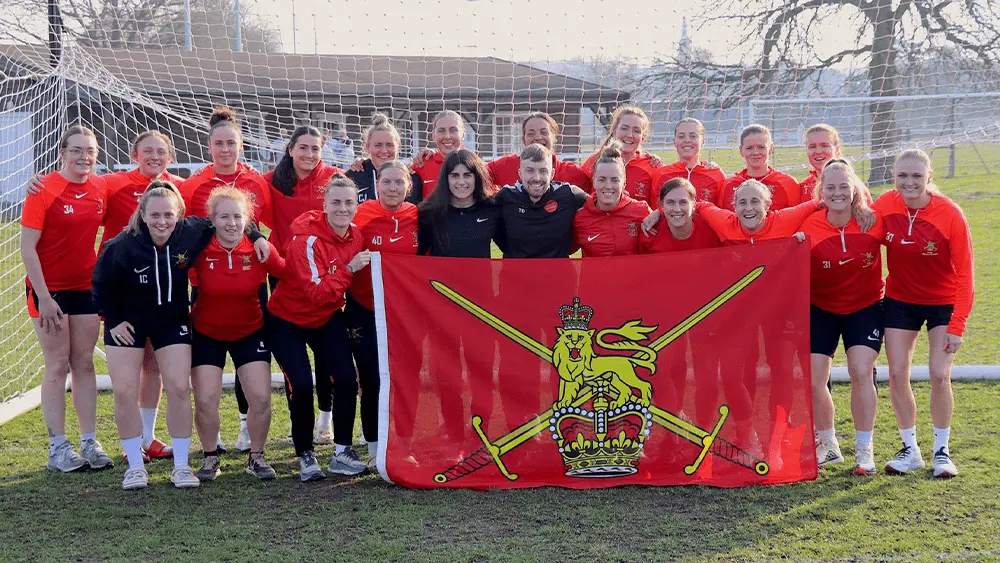
Practice-led? It's all about impact
In our latest blog, Southampton Solent University's Lecturer in Sport Psychology, Tom Doncom, talks practice-led learning and teaching.
11 September 2025
21 November 2024
Kelly Simm, a four-time Commonwealth medallist and World Championship bronze medal-winning gymnast, is supporting students at Southampton Solent University to reach new heights in their sporting ambitions.
Here, Kelly discusses dual careers and highlights how universities like Solent empower emerging athletes to achieve success on their own terms.
--
Following an inspiring Olympic and Paralympic Games where the nation watched in awe while athletes won medals at the highest level of their sport, it is important to reflect on the individual behind the athlete and how they manage to balance life demands with their career.
It's perhaps not widely acknowledge - at least outside of sporting circles - but many athletes who compete on the national and international stage are managing dual careers; maintaining jobs or in education in order to support themselves to compete in their sport. Athletes who pursue sport from a young age, who then go on to excel at an international or professional level, often become efficient at juggling multiple commitments around strenuous training and competition schedules.
It could be largely down to this ability that athletes in dual careers are able to succeed, and it's at universities like Southampton Solent University - through programmes like the University's Sport Excellence - that students learn how to manage academic and professional pursuits with sporting ambition. It doesn't have to be either/or; we're empowering students to do both.
In the UK, the national lottery is one of the main sources of funding provided by UK Sport to programme level athletes, awarded at the discretion of the sport's national governing body. This is a grant which supports athletes with living, training and competition costs. While it's a huge support and will help some athletes to go full time in their sport, it's not normally enough for athletes to successfully train and live off. Some athletes are able to capitalise on their successes and therefore do flexible work through sponsorship deals and appearances, others will still need to hold down part or full-time jobs.
Ahead of the Olympic and Paralympic Games in Paris, you may have noticed some athletes ramping up their social media content and partnerships to make money and financially support themselves. Like me, others may choose to go through higher education to give themselves the qualifications they might need for when their sporting careers ultimately come to an end. More than 10% of athletes who competed in this year's Olympics are at university pursuing a degree, while more than 18% have 'day jobs'. Knowing this, it's essential that institutions like Solent help equip the next generation with the tools they need to not only thrive in sport, but with qualifications that can support them in life beyond sport.
I was fortunate to be a funded athlete on the World Class Programme for 12 years of my gymnastics career. I received an Athlete Performance Award each month which helped support my training and living costs. This award was reviewed every six month based on performance, meaning I could be moved up or down the funding pathway. This, along with sponsorships and flexible work appearances, massively supported me through my gymnastics career and enabled me to pursue a dual career in education alongside my sport. However, every athlete and sport are different, and every athlete will need to put different things in place in order to best support them through their careers.
Universities, with their facilities, resources and expertise, provide a foundation of support for students who are looking to make their mark in sport. At Solent, we've got a reputation for supporting students who come to university pursuing both study and sport. From a dual career perspective, athletes are quickly forced to develop great organisational skills and discipline, and university is a great place to cultivate these skills.
As a young athlete, I was granted permission to miss lessons from school to get more training hours in each week, so I learnt very early how to balance long training hours with education as I went up through the system. For others, they will be working out how they can fit jobs in alongside sporting schedules, while also having to factor in recovery time, physio appointments and competitions. Having great support networks and systems in place - like an expert team at their place of study - are vital when it comes to helping dual career athletes thrive.
At Solent, we currently have 18 national and international athletes on the Sport Excellence Programme, providing each athlete with £16,000 worth of practitioner support that they may otherwise have to source and fund themselves. This includes services such as strength and conditioning and nutrition and psychology sessions; sports therapy; and mental health and wellbeing. We also provide financial support in the form of a bursary payment, with the aim of supporting some of the costs athletes have to fund. Perhaps most importantly, we offer academic flexibility to give our students the freedom to achieve.
Universities championing dual careers is massively important in helping student-athletes gain qualifications through elite sport. I came to Solent as a student and was supported brilliantly through my career. Now, I get the opportunity to help support others.
As an athlete, you learn how to work hard, be resilient, deal with pressure, and how to work as a team to overcome any challenges that get in your way. Dual career athletes know that training and competition is only half the job; the discipline and work ethic so many athletes show is why many are able to excel in all areas.
